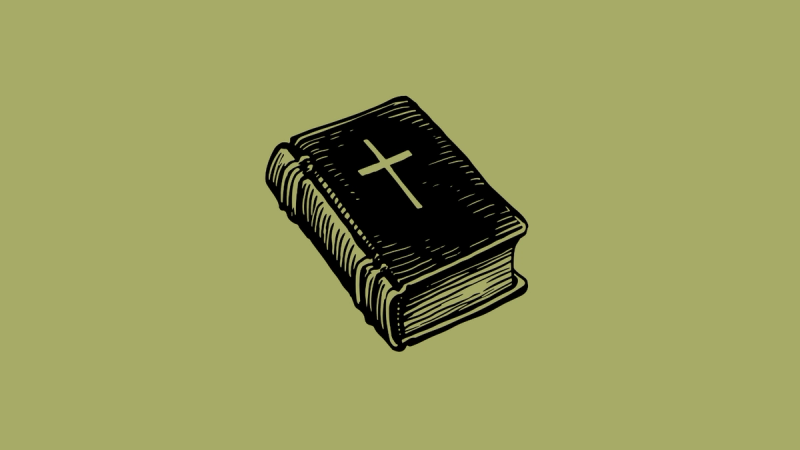Every Advent, millions of Americans will at some point sit down and participate in a long-honored and nearly sacred ritual: watching The Christmas Story. This classic holiday film—no, myth—is chock-full of moments that depict what Christmas means, not theologically but emotionally to nine-year-old boys. This is nowhere truer than the segment of the movie involving Ovaltine.
Do you remember the scene? Ralphie finally gets the Ovaltine Decoder Ring (along with the official acceptance letter and seal of Annie Ovaltine). His mind races as to what important message may be coming down the pike for him. “The fate of the world may hang in the balance,” his older self narrates. He listens on the radio for the numbers “from Annie herself” and hurries off to the bathroom to try to decode the message. His heart races as he lines up the decoder ring with each number and begins to write out the letters:
BeSURETODRINKYOUROVALTINE
“Ovaltine?” Ralphie says to himself as the realization sinks in. “It’s just a crummy commercial!”
Ralphie’s disappointment at being promised an important, even vital, message and instead being sold something is both understandable and unfortunately all too common for people today. We constantly feel over-
promised and under-delivered. Like the Facebook friend who messages you after fifteen years to see how you’re doing—only to let you know of the incredible opportunity to get in on the ground floor of her new essential oils program—we cannot help but feel that we’re constantly promised something great only to realize it’s just another gimmick.
Churchgoers have also felt this dilemma. We have multiple things held out to us: programs, books, clubs, campaigns—all with the promise that this will change our life—only to leave us feeling understandably disenchanted when we discover that these were just marketing schemes to entice us to click.
I believe this has had massive implications for modern evangelicalism’s approach to Christian doctrine, particularly its doctrine of Scripture.
In an environment where the promises of personal and church growth revolve around programs and new methods, many a churchgoer (and many a pastor) has been left with a relatively arbitrary relationship to Scripture. Now, to be clear, most evangelicals today still believe in Scripture. It’s a box they still check Yes. But too few know what to do with Scripture. In other words, after I’ve acknowledged I believe it to be true, what exactly am I supposed to do with it, much less expect of it?
In many ways, the church today is in a similar position to the church that the Reformers inherited and were attempting to change. The medieval Catholic Church was far from spiritually dead. There were programs, festivals, methods, practices, books, guilds, crusades, everything a medieval Ralphie could have imagined. There was also a growing cynicism as people began to notice that the secret message turned out to be “just a crummy commercial” for the giant Catholic Church machine. Eamon Duffy, in his famous work The Stripping of the Altars, describes the pre-Reformation church in England as almost a paradise of spirituality. There were spiritual practices galore. Whole towns would jump in on the party. Festivals and feasts marked the life of the entire village.
The regulated and regular piety of the middling sort, geared to the daily and weekly observances of the parish churches and the steady patterns of urban living, could accommodate both the seasonal cycles of Advent and Easter and the sober pursuit of virtue, day in and day out, urged in the devotional material which . . . poured out. For townsmen and countrymen alike, the rhythms of liturgy on the eve of the Reformation remained the rhythms of life itself.
It was, as Charles Taylor put it, “enchanted.”
But the Reformers saw all of this as a problem. It wasn’t that festivals, spiritual practices, fervent worship, or the like were necessarily bad, but they had gotten to the point where God himself, the true and living God, had been lost in the midst of it all. They saw the medieval Catholic Church similarly to how the Old Testament prophets saw Israel:
“The multitude of your sacrifices—
what are they to me?” says the Lord.
“I have more than enough of burnt offerings,
of rams and the fat of fattened animals;
I have no pleasure
in the blood of bulls and lambs and goats.
“When you come to appear before me,
who has asked this of you,
this trampling of my courts?
“Stop bringing meaningless offerings!
Your incense is detestable to me.
New Moons, Sabbaths and convocations—
I cannot bear your worthless assemblies.
“Your New Moon feasts and your appointed festivals
I hate with all my being.
They have become a burden to me;
I am weary of bearing them.
“When you spread out your hands in prayer,
I hide my eyes from you;
even when you offer many prayers,
I am not listening.” (Isa. 1:11–15)
God is not conjured up, Isaiah says, by the fervency or frequency of your spirituality. In fact, you can be extremely energetic spiritually and God might just be completely absent.
So, what were people in Old Testament Israel and the medieval Catholic Church to do? What are we supposed to do today? The Reformers had an answer: return to Scripture. For them, Scripture wasn’t only a box to check to say that they believed it to be true. It was the source, the sum, and the salve to the spiritual life, particularly to the exhausted spiritual life.
First, the Protestant Reformers saw the Scriptures as the source of the Christian life. The goal of the Reformers was to functionally get out of the way of the word as it did its work in the lives of those who heard it. They believed it would accomplish this work, because it isn’t just a simple collection of ideas. Within its pages, people would find God himself.
Thomas Cranmer, the archbishop of Canterbury responsible for midwifing the birth of the Reformation in England, compiled a series of homilies to be used in churches until pastors could be trained how to properly preach sound doctrine. The first of these homilies, written by Cranmer himself, was on the power of God’s word: “The Fruitful Exhortation to the Reading and Knowledge of Holy Scripture.” In his section on why the Scriptures are so important, he wrote:
For in Holy Scripture is fully contained what we ought to do and what to eschew, what to believe, what to love and what to look for at God’s hands at length. In these books we shall find the Father from whom, the Son by whom and the Holy Ghost in whom all things have their being and keeping up.
We aren’t simply reading these books to get new ideas. Rather, within this book, we find directions on how we are to approach the Triune God. We not only find direction on what to love, what to reject, what to do, what to believe, but we also find God himself, present within his word: God who is Father, Son, and Holy Spirit. The Scriptures are not simply repositories of ideas or cold doctrine. They’re the place in which God promises that he will be found.
Second, the Reformers believed the Bible was the sum of the Christian life. The Scriptures contained all things necessary for salvation. In the same homily, Cranmer said, “There is no truth nor doctrine necessary for our justification and everlasting salvation but that is, or may be, drawn out of that fountain and well of truth.” For Cranmer and his contemporaries, this radically reshaped their approach to the spiritual life. No longer was our spiritual energy and focus to be drawn from our own activity in church and society, but rather our spiritual energy must flow from believing the word of God.
Understanding that the Scriptures contained all things necessary for salvation also freed the conscience of the believer. This created the context within which a Roman Catholic parish priest could now finally become a pastor. As the Reformers returned to the Scriptures, they recognized that it and it alone had authority over both the church and the Christian. Therefore, the Christian conscience could only be bound by the Bible. This set the proper limits and context of the church’s authority. The church was not the mediator between Christ and his flock, and the parish priest was not an extension of the pope’s authority. Rather, the priest was a pastor who shepherded Christ the mediator’s flock until he returned to get them. This minister, or under-shepherd, could only speak Christ’s word to his flock, could only demand obedience to Christ’s command, and could only commend faith in Christ as the mark of his true sheep.
This shift in pastoral responsibility also created a vacuum in society. When people realized that the only things the church could impress upon its people were those that could be proven from Scripture, suddenly everyone’s calendars opened up! People no longer had to spend every waking moment obsessed with their “spiritual activities” beyond what God’s word required, but could simply enjoy the gifts of God’s creation. In a real sense, the “secular” world isn’t a bug of the Reformation, but a feature. Christians could now simply pursue any legitimate vocation as honoring to the Lord. We could love and lead our families well, knowing that God is Lord of all of life and will give us wisdom from his word for all our various callings.
In these and other ways, the Reformation’s recognition that the Scriptures are sufficient for salvation contributed massively to reshaping the church and society in the sixteenth and seventeenth centuries. Its effects are still felt today.
This leads me to my final point: As the church’s ultimate guide and authority, the Scriptures became the salve for the Christian life. Since the Scriptures are where God is found in gospel grace, and since the life of the believer is to be governed according to Scripture, only there—but truly there—can God’s people find peace. Through his word our Lord provides rest.
A church, family, or individual Christian whose spiritual life is focused on the word of God read in community is going to be a church, family, or individual at rest. They will find rest in these words because these words actually provide God’s rest. Hebrews 4 tells us that “there still remains a Sabbath rest for the people of God,” and exhorts us to make every effort to enter that rest. How does one make an effort to enter into rest? Hebrews 4:12 tells us:
For the word of God is alive and active. Sharper than any double-edged sword, it penetrates even to dividing soul and spirit, joints and marrow; it judges the thoughts and attitudes of the heart.
The Christian who hears the word of God is invited into the Sabbath rest of God’s people. “Today if you hear his voice” (Heb. 4:7), you can enter into the eternal rest of God: no programs, no prayer cloths, nothing extraordinary at all. The Spirit employs the simple hearing and receiving of God’s holy word and the promises contained therein to bring about complete regeneration and transformation and complete rest.
Martin Luther, reflecting on the Reformation and his participation in it, said this:
I simply taught, preached, and wrote God’s Word; otherwise I did nothing. And while I slept, or drank Wittenberg beer with my friends Philip and Amsdorf, the Word so greatly weakened the papacy that no prince or emperor ever inflicted such losses upon it.
For Luther, it was the living and active word of God that did all the work—even while he enjoyed beer with his colleagues.
I have seen the living and active word have a powerful effect in my own ministry. A few years ago, I was a chaplain at a Christian school. I was meeting weekly with a student trying to figure out if he was a Christian who wanted to read the Bible together. So, we would meet—without beer—and read Luke out loud to each other while I offered brief thoughts. I really didn’t think much of it, to be honest. It was kind of a ho-hum part of my week; I was involved in seemingly more important things like teaching ethics and leading chapel services.
One day, before he arrived, I remembered we were supposed to meet and thought, “I hope he doesn’t show up today. I’ve got too much going on.” Great pastoral move! Sure enough, at our normal time slot, there was a knock on my door. But that day he asked if we could read from the Passion narrative instead (it was Holy Week, so he had been hearing a lot about it). I said, “Sure,” and we skipped ahead in Luke to read the crucifixion story.
In Luke’s telling of the Passion, there’s a common refrain that if Christ is who he claimed to be, he could have saved himself but couldn’t (or wouldn’t) do it. This occurs in the text over and over again. And as I was reading the passage out loud—again, my heart not really in it, just going through the motions—suddenly, I heard the student sniffling.
I looked up and he wasn’t just sniffling; he was crying. And he kept saying to himself, “Why didn’t he save himself? Why didn’t he save himself?”
I realized in that moment that although I, as the minister, was completely checked out of the situation, the Holy Spirit was not. And through the simple reading of God’s word—even by a minister who didn’t want to be there—something profound was happening in this student’s heart.
And so shall my word be that goes out from my mouth; it shall not return to me empty, but it shall accomplish that which I purpose, and shall succeed in the thing for which I sent it. (Isa. 55:11)
It is this powerful word—the word proclaimed directly from God’s mouth, through the Scriptures, through the minister or the fellow believer, into the ears of sinners—that brings dead hearts to life and calls prodigals home. Let us commit ourselves, once again and always, to return to this word as the source, sum, and salve of our ministry. The Scriptures are the power of God for salvation, containing everything necessary for us to know and believe to be saved, carrying the healing message that brings rest to a burdened and weary world. We need not further exhaust our congregants with programs upon programs, discipleship plans, small groups, or vast spiritual re-enchantments of the world. They get all they need through the word—read, preached, and made visible in the sacraments among God’s gathered saints. Let our people flourish in their homes and vocations as they enjoy and honor God in creation. Ralphie doesn’t need one more “crummy commercial.” He needs to hear and rest in the good news of the answer to my student’s question: “Why didn’t he save himself?”
Because, my friend, he was saving you.
Footnotes
Eamon Duffy, The Stripping of the Altars, 2nd ed. (Yale University Press, 2005), 51–52.
BackThomas Cranmer, The Books of Homilies: A Critical Edition, ed. Gerald Bray (James Clarke, 2015), 7.
BackCranmer, Homilies, 7.
BackMartin Luther, Second Sermon, March 10, 1522, Monday after Invocavit. Luther’s Works, vol. 51, ed. J. J. Pelikan, H. C. Oswald, and H. T. Lehmann (Fortress Press, 1999), iii–78.
Back







